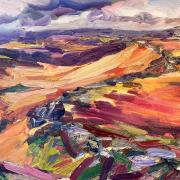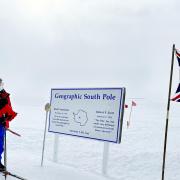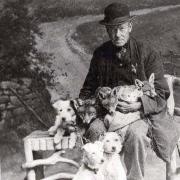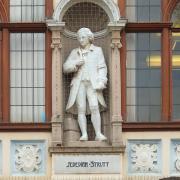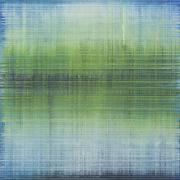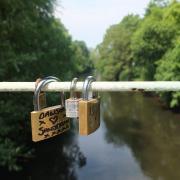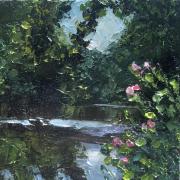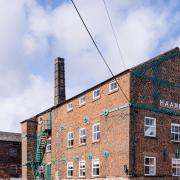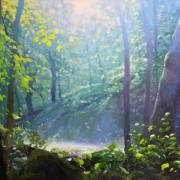Local novelist Joanna Courtney’s eagerly awaited novel Iron Queen will be published later this year. Catherine Roth meets the author.

A local author is enjoying publishing success with her eighth novel, due to be published this year. Joanna Courtney writes both historical and contemporary fiction and first found success after a serial she wrote for the short story magazine People’s Friend was published as a stand-alone novel in 2013. Since then she has written two historical trilogies and three contemporary novels. However, she still regards herself predominantly as a historical writer. Joanna says, ‘In my heart of hearts I’m a historical fiction writer. I’m passionate about history, ancient history and women’s roles in history.’ It comes as no surprise, therefore, that her two trilogies tell their stories from the point of view of their heroines. Queens of the Conquest focuses on events that culminate in the Battle of Hastings as seen through the eyes of Edyth, Harold Godwinson’s wife; Elizaveta of Kiev, wife of Viking warrior Harald Hardrada who was defeated at Stamford Bridge; and Mathilda of Flanders who was married to William the Conqueror.
Joanna’s journey back in time to 1066 came about almost by accident. She was researching local history for a book she had been commissioned to write by Dishley Farm in Loughborough when she discovered that the farm had once been owned by Queen Edyth. It was this that led Joanna to begin researching the period of 1066 and to explore the role of women in history.
Her love of strong female characters in history continues with her second trilogy Shakespeare’s Queens, featuring Lady Macbeth, Ophelia and King Lear’s daughter Cordelia, where Joanna puts forth somewhat truer accounts than those given by Shakespeare. Blood Queen tells the story of Lady Macbeth. Joanna says, ‘There is a different Lady Macbeth out there to the one we all know and it really sparked my interest. The poor woman was maligned by Shakespeare – the real Lady Macbeth was so not like that, she was dazzling. She was a genuine contender for the throne who had to fight really hard and held the throne with Macbeth for 15 years.’
Joanna begins her novels with extensive research. She says, ‘Historically wise I’m a big fan of research – I absolutely love it! It’s the joy of finding out new stuff. With 1066 I started very wide and researched the period generally. It’s not like later history where there is a lot to read – even the sources are not always contemporary. It’s about finding out about life – what did people eat? How did they deal with their periods and go to the toilet? It’s very important.’

However, Joanna doesn’t forget that she is telling a story. ‘Creating an exciting story and pulling readers into the world is my first duty – it’s the joy of being a novelist rather than a historian! A historian would say it could have been this or that but in my story I can say “This happened!”’ This doesn’t mean though that the novels are light on research. Joanna says, ‘It’s very important that most of what I put into my novel could have happened and it’s my duty to make the stories as true to what may have been. I try to capture the social feel, culture and attitudes of the time.’
Joanna looks for what she describes as ‘nuggets of gold’ in her research, small but important pieces of information that give her an insight into what a character may be like. Once she has gathered the research, Joanna creates a spreadsheet that provides a detailed and accurate timeline of when events, however large or small, happened. From this she decides which details to include and which to omit. Joanna says, ‘I focus on the women and highlight what went on in their lives so there are battles but as the women are often waiting for the men to return it’s not all blood and gore!’ She then creates a chapter by chapter summary before setting out to write the novel. Joanna writes a chapter each morning in longhand before typing it up and once she has a first draft begins the task of editing.
Since an early age Joanna had always wanted to be a writer. She began writing her own stories when she was just six and was always a keen reader. Joanna says, ‘I devoured stories and always had my head in a book. In half of the family photos I was in when I was young, my head was half in a book or a book was held reluctantly at my side!’ She also developed a love of history, inspired by a visit to Holyrood Palace with her grandma. Joanna says, ‘One of the rooms is where Lord Darnley murdered David Rizzio and there is a blood patch on the floor – it is touched up every now and again,’ she adds smiling. ‘I can still picture staring down at this, standing on the same floorboards where this event happened. This imprint on history fascinated me.’ She describes ‘inspirational’ tutors, both at school and then university where she studied Arthurian and Medieval literature, for further developing her enthusiasm for the subject.
Unlike with her contemporary fiction, there are few places that Joanna is able to visit that still bear some resemblance to the places they were many years ago, having changed beyond comparison. She says, ‘The Saxons and Vikings built in wood, which has long since mouldered away into the ground.’ However, she did go to Normandy to visit two cathedrals built by Mathilda and William of Normandy where she was able to admire the architecture and visit Mathilda’s tomb. Joanna also visited three hill forts in Leicestershire – Beacon, Breedon and Burrough when researching Iron Queen, which is set in 500BC. She says, ‘To some extent these earthworks have been preserved. On Burrough Hill there is still a gap where a gate would have been. I was literally just standing there on the earthworks and thought “Wow!” It was a nice peaceful day and I got a real feel for the place. Although there are now power stations and homes in the way, the land in the area has not changed hugely and I was looking out at the same land my heroine would have been looking out at. Standing in the shoes of heroines definitely helps!’ she smiles.

Joanna’s contemporary novels include Bonnie and Stan which tells the story of 50 years of romance as well as her most recently published novel Four Minutes to Save a Life. The latter is a tale about loneliness in modern society and in the novel we meet Charlie, a supermarket delivery driver. Joanna says, ‘For some people, the delivery driver can be the only person they can talk to and helps them connect.’ She adds, ‘Four Minutes to Save a Life is inspired by all the lovely delivery drivers who deliver my weekly shopping!’ Joanna writes her contemporary novels as Anna Stuart, explaining that it helps with clarity so that readers don’t pick up a book expecting a historical novel only to find it’s a completely different book.
Joanna’s writing career is a busy one, not least because in addition to writing novels, she also teaches Creative Writing for the Open University, gives talks and runs various writing workshops around the country. She says, ‘There’s a lot to fit in but I like it that way!’
Despite a busy schedule that involves juggling her writing life with being a mum – she has two stepchildren who have left home and two teenage children – she still finds time to relax, whether by walking the family’s dog around Kirk Langley where she lives, reading, going to the theatre or enjoying a pint of real ale in a good Derby pub. She’s also keen to take up rowing again, a sport she enjoyed in her youth and which saw her winning gold medals at Henley. She adds, ‘When my husband retires he says he’ll drive me around Europe in a camper van and I’ll write novels. He’ll do the cooking and – more importantly – the cleaning so I can be a lady of leisure writing novels!’
With her growing collection of novels Joanna has no intention of slowing down and is already busy working on her next books, shining light on forgotten histories and portraying our modern lives.






